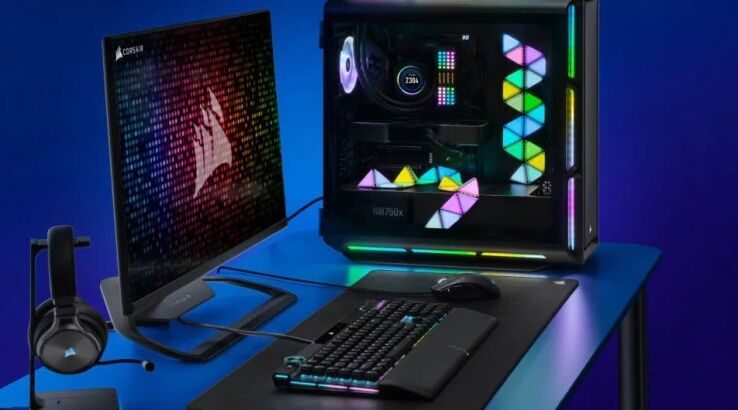Corsair announces iCue LC100 RGB light panels for your case
Glam up your system with this new kit

WePC is reader-supported. When you buy through links on our site, we may earn an affiliate commission. Prices subject to change. Learn more
Corsair is a master of over the top RGB lighting, and with their ecosystem featuring Corsair iCue is one of the most versatile pieces of software for any of those who wanted to mess around with their PC’s lighting. Now, they have just announced iCue LC1000 accent lighting panels, which are shaped like triangles and can magnetically stick to your case for an extra performance boost. That last bit was a lie. It’s purely for aesthetics, of course. These mini-triangles can even connect together, so you can create 3D objects, and is controlled via Corsair’s Lighting Node Pro proprietary controller.
One thing that really grinds our gears at WePC is unnecessarily proprietary hardware, and unfortunately, all of Corsair’s lighting suite falls afoul of this grave sin. The pinout is slightly different from the normal addressable headers, which is standard on many motherboards, and also use a different connector, though essentially the data running through them is the same.
This forces you to engage with their own proprietary suites of accessories and hardware, even though technically, it should just plug into your motherboard just fine if you were to use a converter. With that said, iCue is an impressive piece of software, and this hardware lockout is just another way for Corsair to worm itself into your PC’s ecosystem. It’s the antithesis of the nature of building PCs, and honestly? The less we see of these walled gardens penetrating the PC building space, the better.
With that out of the way, the lighting panels are fully-diffused meaning there’s no garish ‘naked’ LED look, and one controller node can support up to 18 lights in your case. This is a cool idea, but it, unfortunately, won’t be cheap.
Corsair iCue LC 100 RGB lighting panels price
Corsair is asking for $129 USD for the iCue LC 100 RGB lighting panel starter kit, which includes nine panels in addition to the controller node. But, if you were looking to get more than the nine that are included, you can also grab yourself an additional expansion kit for the eye-watering sum of $100 USD.
While the pricing for these panels includes R&D and support for Corsair’s software development for the excellent iCue. Ultimately, they’re just really fancy LEDs. If $129 is reasonable to you and fits within your budget, then power to you, but for most, this entirely superfluous accessory will ultimately mean more e-waste down the line once your PC is all over and done with, and offers nothing in the way of performance, aside from some fancy lights. Even Corsair’s video shows the panels being displayed on the bottom of a PC case, where it could possibly hinder airflow. These panels might look fancy, but we’re honestly no fans of what it has to offer in any way, shape or form. The practices by Corsair with regards to ARGB standardisation are actively anti-consumer, and we struggle to see the benefit of doing this to their consumers.
Are the Corsair iCue LC 100 RGB lighting panels worth it?
Ultimately, it’s down to how much cash you have, and what you want to spend on an element of your system that solely exists for aesthetic purposes. It might help your PC look pretty, but $129 is a steep price for something that is functionally completely useless. Unless you get a tingle down your spine when you see hundreds of synced RGB panels in your PC, maybe give this one a miss. You can check out how to set up the LC100 RGB lighting panels below:
Looking for more from Corsair and Elgato? Check these out: